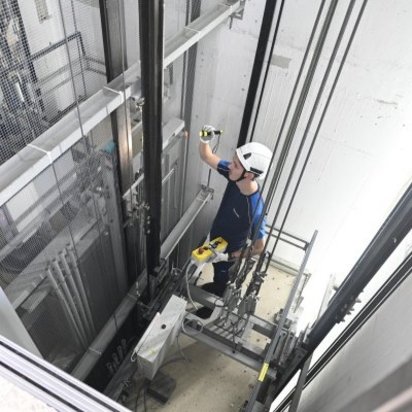When lift inspectors talk to themselves
TÜV NORD supports defect detection with the help of artificial intelligence.

TÜV NORD supports defect detection with the help of artificial intelligence.

The first elevator inspectors at TÜV NORD now have the support of an AI (artificial intelligence) in their work: From now on, the experts will document defects during the inspection by voice input and no longer on the computer as before. The advantages: Time savings and even greater accuracy.
The periodic elevator inspection is carried out in exactly the same way as before - the inspector examines the entire system. Many details are scrutinized: These include the electronic controls, in the machine room the traction sheave and the steel cables, in the elevator car itself the emergency call and the lighting; quite a few inspections are also carried out on the roof of the car. “Previously, the experts had to type observed defects into an input mask on the computer. Now they only have to use their smartphone to talk to the AI,” says Daniel Contreras Schaffeld, Business Development Manager at TÜV NORD and responsible for implementing the AI-supported voice recognition software for elevator inspections. “This may sound like talking to yourself to outsiders, but it makes the work much easier because you have your hands free and can concentrate fully on the test steps.” The AI now takes care of documenting the inspection, i.e. assigning identified defects to categories. After the inspection, the experts can concentrate on quality assurance and their report, as the defects identified have already been recorded.
The introduction of the AI-supported speech recognition software “voize” was preceded by a long phase of training. First of all, the relevant defects and frequently occurring references for describing defects had to be recorded. The AI then had to be trained to recognize, interpret and correctly assign spoken terms and defect classifications. The advantage for the experts is that they no longer have to memorize a catalog of terms. In addition, the AI understands terms even if they have changed in the meantime, such as the term “pipe burst protection”, which is now defined as “burst pipe valve” in the terminology catalog. The AI is also trained to correctly interpret “its own” terms and abbreviations used by experts.
“However, it is not enough for the AI to learn these terms,” says Daniel Contreras Schaffeld. “People are people, not machines.” The AI must understand dialects and linguistic colorations and react to them correctly. For this reason, the AI was tested with twenty experts from all over Germany and trained to understand voices and dialects.
For Contreras Schaffeld, the documentation of elevator inspections is not the final step: he would also like to make the software suitable for other areas of activity in TÜV NORD's Industry Business Unit: These include tests in the areas of steam and pressure, testing of playground equipment and escalators. It will also be offered in other languages to support TÜV NORD colleagues in other countries. Before that, however, all TÜV NORD elevator inspectors in Germany will gradually work with the software; the AI will now be made available to them.
Founded over 150 years ago, we stand for security and trust worldwide. As a knowledge company, we have our sights firmly set on the digital future. Whether engineers, IT security experts or specialists for the mobility of the future: in more than 100 countries, we ensure that our customers become even more successful in the networked world.
